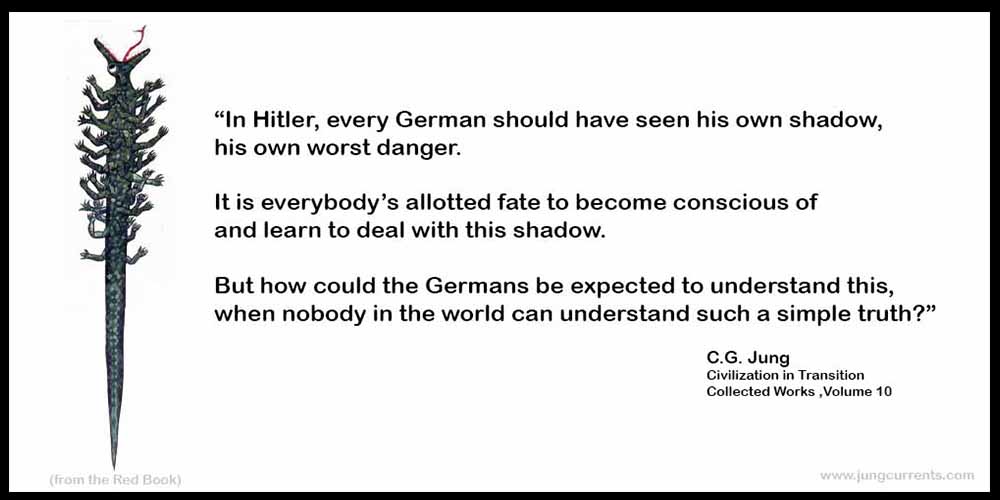C.G. Jung: “In Hitler, every German should have seen his own shadow, his own worst danger.”

From Civilization in Transition
Collected Works Volume 10
Paragraphs 455-456
The individual’s feeling of weakness, indeed of non-existence, was thus compensated by the eruption of hitherto unknown desires for power. It was the revolt of the powerless, the insatiable greed of the “have-nots.” By such devious means the unconscious compels man to become conscious of himself. Unfortunately, there were no values in the conscious mind of the individual which would have enabled him to understand and integrate the reaction when it reached consciousness. Nothing but materialism was preached by the highest intellectual authorities. The Churches were evidently unable to cope with this new situation; they could do nothing but protest and that did not help very much. Thus the avalanche rolled on in Germany and produced its leader, who was elected as a tool to complete the ruin of the nation. But what was his original intention? He dreamed of a “new order.” We should be badly mistaken if we assumed that he did not really intend to create an international order of some kind. On the contrary, deep down in his being he was motivated by the forces of order, which became operative in him the moment desirousness and greed had taken complete possession of his conscious mind. Hitler was the exponent of a “new order,” and that is the real reason why practically every German fell for him. The Germans wanted order, but they made the fatal mistake of choosing the principal victim of disorder and unchecked greed for their leader. Their individual attitude remained unchanged: just as they were greedy for power, so they were greedy for order. Like the rest of the world, they did not understand wherein Hitler’s significance lay, that he symbolized something in every individual. He was the most prodigious personification of all human inferiorities. He was an utterly incapable, unadapted, irresponsible, psychopathic personality, full of empty, infantile fantasies, but cursed with the keen intuition of a rat or a guttersnipe. He represented the shadow, the inferior part of everybody’s personality, in an overwhelming degree, and this was another reason why they fell for him.
But what could they have done? In Hitler, every German should have seen his own shadow, his own worst danger. It is everybody’s allotted fate to become conscious of and learn to deal with this shadow. But how could the Germans be expected to understand this, when nobody in the world can understand such a simple truth? The world will never reach a state of order until this truth is generally recognized. In the meantime, we amuse ourselves by advancing all sorts of external and secondary reasons why it cannot be reached, though we know well enough that conditions depend very largely on the way we take them. If, for instance, the French Swiss should assume that the German Swiss were all devils, we in Switzerland could have the grandest civil war in no time, and we could also discover the most convincing economic reasons why such a war was inevitable. Well—we just don’t, for we learned our lesson more than four hundred years ago. We came to the conclusion that it is better to avoid external wars, so we went home and took the strife with us. In Switzerland we have built up the “perfect democracy,” where our warlike instincts expend themselves in the form of domestic quarrels called “political life.” We fight each other within the limits of the law and the constitution, and we are inclined to think of democracy as a chronic state of mitigated civil war. We are far from being at peace with ourselves: on the contrary, we hate and fight each other because we have succeeded in introverting war. Our peaceful outward demeanour merely serves to safeguard our domestic quarrels from foreign intruders who might disturb us. Thus far we have succeeded, but we are still a long way from the ultimate goal. We still have enemies in the flesh, and we have not yet managed to introvert our political disharmonies. We still labour under the unwholesome delusion that we should be at peace within ourselves. Yet even our national, mitigated state of war would soon come to an end if everybody could see his own shadow and begin the only struggle that is really worth while: the fight against the overwhelming power-drive of the shadow. We have a tolerable social order in Switzerland because we fight among ourselves. Our order would be perfect if only everybody could direct his aggressiveness inwards, into his own psyche. Unfortunately, our religious education prevents us from doing this, with its false promises of an immediate peace within. Peace may come in the end, but only when victory and defeat have lost their meaning. What did our Lord mean when he said: “I came not to send peace, but a sword”?

Yeah… pretty much, sigh…
Profound indeed
Profound, most profoond… relevant now as it was then